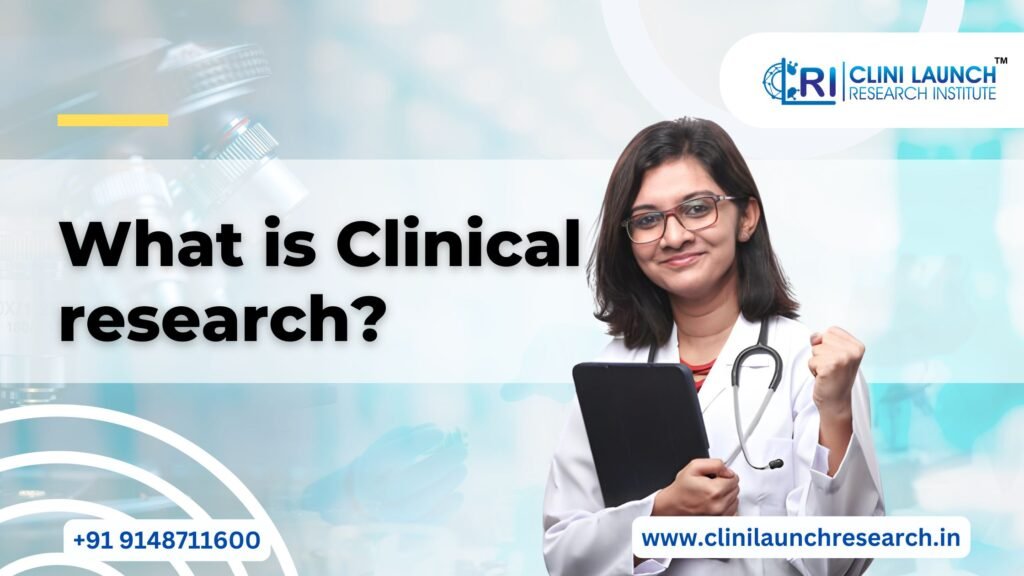What’s your first thought about taking a drug? RISK? Well-Being? Fear Of Side-effects? Carefree?
Most people worry if a treatment works for them, does it work better than other treatments, does it have side effects. A one-stop solution to all our queries is Clinical Research.
Developing a new medicine begins with understanding the disease or disorder and condition thoroughly.
Clinical research provides clues about how to treat diseases and potential ways to study the symptoms or underlying causes.
Researchers conduct preclinical studies on cells, tissues, and animal models, in a silico method to determine whether the condition can be influenced by medicine. Then a promising molecule or new chemical entity(NCE) becomes a “Drug”
What is Clinical Research? Clinical research means conducting experiments on humans to validate new treatments, drugs, and medical devices for better health and care.
Clinical research is building evidence for new approaches that are safe and effective.
The goal of clinical research and clinical research professionals is to improve existing medical care and invent evidence-based, cost-effective treatments to improve quality of life.
Clinical trials assess new formulations, technologies, and risk factors to be studied and perform interventional trials on human participants to confirm the therapeutic use, effect, and safety of new drugs before marketing approvals.
Major Stakeholders of a Trial
All stakeholders essentially need to come together to address increasingly diverse approaches, systemic barriers to participation, new technology innovations, and working on customised approaches in clinical research.
It’s the era of effective and meaningful engagement, education, and multi-stakeholder partnerships that are critically important to achieve global clinical trials.
India is emerging as the global development hub for clinical research and will continue to evolve in this area for the next decade as well.
Clinical research regulatory framework changes have led to faster approvals and migration to digital technology for increased transparency and clarity. New Drugs and Clinical Trial Rules favour the current market trends for the development of clinical trials.
The use of the internet and mobile has greatly flagged the way for tech driven clinical trials. Virtual monitoring and digitization have reduced the time taken for clinical research.
Artificial intelligence has amplified human capabilities like smart advisors for scientists, robots, and computational creativity for designers. Regulatory authorities have widely approved and applauded. SPONSOR CRO Patients Investigators Regulatory Bodies Major Stakeholders of a Trial Patients or healthy people who participate in trials are volunteers. They can be patients with a disease or healthy people who want to help increase medical knowledge.
Clinical Studies are executed in two types https://clinilaunchresearch.in/contact-us/
a) Intervention or Experimental
b) Observational
Clinical trials are usually conducted in three phases before regulatory agencies consider them safe and effective. Trials are also conducted according to ICH, Good Clinical Practice (GCP) guidelines that regulators require to protect patient safety.
Phase I- a small number of participants, healthy human volunteers, or very sick patients for whom treatment options are lacking (life threatening disease) The main objective is the drug’s safety and to establish the maximum dose tolerated.
Phase II (generally 20-300 depending on the type of disease) Therapeutic exploratory study is designed to evaluate the safety and efficacy of an investigational medicine in patients with underlying disease. Drug safety and effects to determine the safest and most effective dosing regimen.
Phase III (300–3,000 or more depending upon the disease being studied) is designed to confirm the safety and efficacy of an investigational medicine. Results from phase 3 determine how the compound is best prescribed to patients in the future.
Phase IV (Post-Marketing Surveillance, also called Late phase Trials) is designed to provide broader efficacy and safety information about the new medicine after Marketing Authorization in large numbers of patients, and subpopulations of patients for the long-term benefits and risks.
Hope this helps readers understand the importance of taking part in clinical trials. The real word data (RWE) we contribute to the clinical research team greatly helps evaluate the efficiency of the new drugs.
Being part of a clinical trial is being as proud as serving the nation. When a new drug hits the market one can proudly acclaim the contribution and passive rewards.
The current time period of clinical research facilitates participants to take the informed consent documents home, read them over several times, and discuss them with their physicians and family members. Their physicians can help clarify some of the participation risks. Once participants review the informed consent documents carefully, they may provide free voluntary consent to the clinical trial.
The benefit of clinical research participation helps patients get expert and in-person medical care at good infrastructure Hospitals. Helping others by contributing to medical research. Receiving a new intervention before it becomes available to the public and that works for you. https://clinilaunchresearch.in/courses/
If you are associated with the clinical research industry as a participant or a Clinical researcher or vendor be sure to solemnly follow quality, Integrity, and moral responsibility to vouch for a drug to your own family member!!!







Great post however , I was wanting to know if you could write a litte more on this subject? I’d be very thankful if you could elaborate a little bit further Bless you!
Can you be more specific about the content of your article? After reading it, I still have some doubts. Hope you can help me.